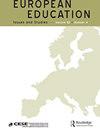19世纪和20世纪初德语和俄语文化中对拼写错误态度的变化。
IF 0.9
Q4 EDUCATION & EDUCATIONAL RESEARCH
引用次数: 0
摘要
摘要本文展示了对拼写错误的污名化如何先于现代德语和俄语的正字法,以及这种态度如何在19世纪从普鲁士传入俄罗斯。规则很难学,也很难教,因此错误不可避免。基于错误数量的评分有助于控制和纪律学生和管理教师。大规模义务教育的压迫性质既是现代性在国际上获得力量的产物,也是它的障碍。本文章由计算机程序翻译,如有差异,请以英文原文为准。
The Changing Attitudes Towards Spelling Mistakes in German and Russian Speaking Cultures, 19th and early 20th c.
Abstract The article shows how stigmatization of misspelling predated modern German and Russian orthographies and how this attitude was imported to Russia from Prussia in the 19th century. Rules were difficult to learn and to teach, making mistakes inevitable. Grading based on the number of errors helped to control and discipline students and to manage teachers. The repressive nature of mass, compulsory schools was both a product of and a hindrance to modernity gaining strength internationally.
求助全文
通过发布文献求助,成功后即可免费获取论文全文。
去求助
来源期刊

European Education
EDUCATION & EDUCATIONAL RESEARCH-
CiteScore
1.20
自引率
0.00%
发文量
5
期刊介绍:
uropean Education is published in association with the Comparative Education Society in Europe (CESE). It is an international peer-reviewed journal devoted to original inquiries and dialogue on education across the member states of the Council of Europe. Established in 1969, the journal features articles on education in individual member states, comparative studies on education across Europe, as well as the impact of European education initiatives globally. The journal especially encourages theoretical and empirical studies, interdisciplinary perspectives, and critical examination of the impact of political, economic, and social forces on education. European Education includes reviews of books and educational films, including those published/produced in English and other languages.
 求助内容:
求助内容: 应助结果提醒方式:
应助结果提醒方式:


